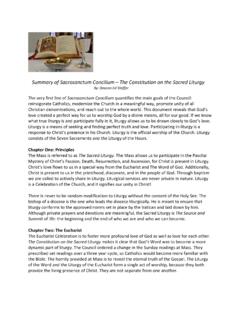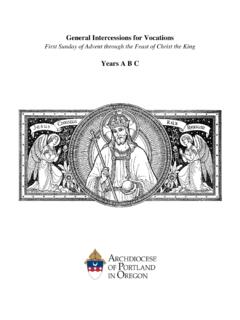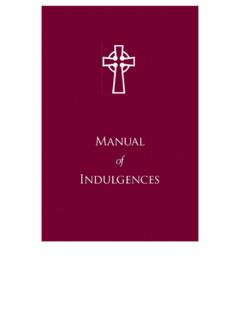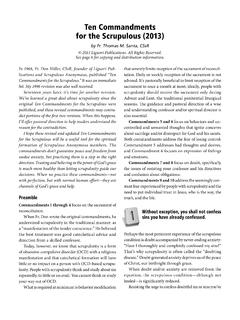Transcription of THE SACRAMENT OF PENANCE
1 St. Joseph s Church Moulton & St. Mary s Church Praha 4th Sunday of Lent 2014 THE SACRAMENT OF PENANCE Why should I go to Confession? Every time we sin, we hurt ourselves, other people and God. The SACRAMENT of Reconciliation (also called PENANCE or Confession) was given to us by Christ to help us reconcile with Christ and his Church when we have committed harm. Through the SACRAMENT , we acknowledge our sins, express our sorrow in a meaningful way, receive the forgiveness of Christ and his Church, make reparation for what we have done and resolve to do better in the future.
2 During his public life, Jesus both forgave sins and reintegrated sinners into the community. This is the goal of the SACRAMENT of Confession: to forgive sins and to provide reconciliation with the Church. The SACRAMENT of PENANCE & Reconciliation involves four parts: contrition, confession, PENANCE and absolution. Contrition: a sincere sorrow for having offended God and the most important act of the penitent. There can be no forgiveness of sin if we do not have sorrow and a firm resolve not to repeat our sin. Confession: confronting our sins in a profound way to God by speaking about them aloud to a priest. PENANCE : an important part of our healing is the PENANCE imposed in reparation for our sins.
3 Absolution: the priest imparts the words which reconcile a sinner to God through the merits of the Cross. Why do I have to confess my sins to a priest? As the Catechism of the Catholic Church points out, our faith in the forgiveness of sins is tied to faith in the Holy Spirit and the Church: It was when he gave the Holy Spirit to his apostles that the risen Christ conferred on them His own divine power to forgive sins: Receive the Holy Spirit. If you forgive the sins of any, they are forgiven; if you retain the sins of any, they are retained (976; cf. John 20:22-23). Will the priest ever repeat what I have said in my confession? A priest can never reveal to anyone what he is told in a confession.
4 This obligation of absolute secrecy is most serious and is called the sacramental seal (CCC no. 1467). St. Joseph s Church Moulton & St. Mary s Church Praha 4th Sunday of Lent 2014 What if I m not comfortable going face-to-face? You can receive the SACRAMENT face-to-face or with a screen or grated window between you and the priest. Most confessionals have a screen behind which you can kneel during your confession if you prefer. Won t the priest remember what I said? I m embarrassed: I don t want him to think badly of me. The priest s purpose is not to keep a check-list on people, but to be an instrument of Christ in receiving someone s sorrow, bringing forgiveness and helping people move forward.
5 A priest hears a large number of confessions. He is not there to judge the person, but rather the nature of the sin, and to offer counsel and encouragement to overcome the sin and to grow spiritually. He too goes to confession, so he knows how it feels to confront one s own sins and ask for forgiveness. How often should I go to Confession? Catholics are required to receive the SACRAMENT at least once per year. However, if you are aware of having committed any mortal (serious) sin, you should receive the SACRAMENT . That being said, all are encouraged to take advantage of the SACRAMENT on a regular and frequent basis. Frequent reception helps us keep aware of our spiritual progress and provides the grace to overcome our sins.
6 Can I receive Communion without going to Confession? When you receive the Eucharist you affirm that you are in a state of grace, reconciled with God and the Church. Since the SACRAMENT of Confession provides that reconciliation, if you are in a state of mortal sin you must abstain from receiving the Eucharist until you go to Confession. A mortal sin consists of a serious action through which a person turns away from God s law and charity, fully understands it is wrong and chooses to commit it freely. If you have committed venial sins, you may still receive the Eucharist. Venial sins are sins which wound our relationship with God, but consist of less serious matters than mortal sins or are performed without full knowledge or consent.
7 Penitents are encouraged to confess venial sins regularly, since the repetition of these sins can lead to more serious sin. I m divorced. May I receive the SACRAMENT ? If you are civilly divorced and have not remarried or were validly married after receiving a declaration of nullity for your prior marriage, you may participate in the SACRAMENT . If you have remarried outside of the Church and have questions about your situation, we encourage you to speak with your parish priest. If it has been a while since your last confession, remember, Do not fear (Is 41:10). The priest will help guide you. And feel free to take this guide with you! (For more information, visit ) St.
8 Joseph s Church Moulton & St. Mary s Church Praha 4th Sunday of Lent 2014 How to Go to 1. PREPARATION: Before going to confession, take some time to prepare. Begin with prayer, and reflect on your life since your last confession. How have you in your thoughts, words, and actions neglected to live Christ s commands to love the Lord, your God, with all your heart, with all your soul, and with all your mind, and to love your neighbor as yourself (Mt 22:37, 39)? As a help with this examination of conscience, you might review the Ten Commandments or the Beatitudes (Ex 20:2-17; Dt 5:6-21; Mt 5:3-10; or Lk 6:20-26).
9 GREETING: The priest will welcome you; he may say a short blessing or read a Scripture passage. 3. THE SIGN OF THE CROSS: Together, you and the priest will make the Sign of the Cross. You may then begin your confession with these or similar words: Bless me, Father, for I have sinned. It has been [give days, months, or years] since my last confession. 4. CONFESSION: Confess all your sins to the priest. If you are unsure what to say, ask the priest for help. When you are finished, conclude with these or similar words: I am sorry for these and all my sins. 5. PENANCE : The priest will propose an act of PENANCE . The PENANCE might be prayer, a work of mercy, or an act of charity.
10 He might also counsel you on how to better live a Christian life. 6. ACT OF CONTRITION: After the priest has conferred your PENANCE , pray an Act of Contrition, expressing sorrow for your sins and resolving to sin no more. A suggested Act of Contrition is: My God, I am sorry for my sins with all my heart. In choosing to do wrong and failing to do good, I have sinned against you whom I should love above all things. I firmly intend, with your help, to do PENANCE , to sin no more, and to avoid whatever leads me to sin. Our Savior Jesus Christ suffered and died for us. In his name, my God, have mercy. (Rite of PENANCE , no.)














